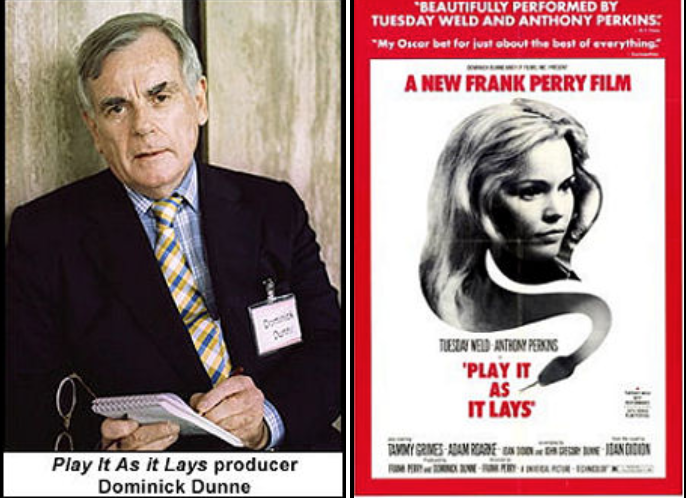 It was the fall of ’03 when I spoke to Dominick Dunne about Play It As It Lays (’72), the affluent-existential-despair Hollywood drama that he produced for Universal, and which Frank Perry directed. The film was about to play at the American Cinematheque and I was trying to drum up support for a DVD release. Here it is six years later and Play It As It Lays still isn’t on DVD. But Dunne died today at age 83, so I thought I’d re-run my ’03 piece in his honor.
It was the fall of ’03 when I spoke to Dominick Dunne about Play It As It Lays (’72), the affluent-existential-despair Hollywood drama that he produced for Universal, and which Frank Perry directed. The film was about to play at the American Cinematheque and I was trying to drum up support for a DVD release. Here it is six years later and Play It As It Lays still isn’t on DVD. But Dunne died today at age 83, so I thought I’d re-run my ’03 piece in his honor.
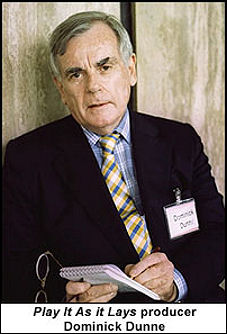

“There’s this better-than-pretty-good film about wealthy jaded Hollywood types called Play It As It Lays, and I’ll bet $50 bucks right now almost no under-40 person reading this column has heard of it, much less seen it.
“The director was the once-very-hot Frank Perry (Diary of a Man Housewife, Rancho Deluxe, Mommie Dearest), and it was based on a respected 1970 Joan Didion novel of the same name, which Ben Stein once called ‘the best novel about Hollywood ever.’
“The stars were Tuesday Weld, Anthony Perkins (playing a cynical gay producer and giving the second-best performance of his life, after Psycho‘s Norman Bates), Adam Roarke (best thing he ever did), Tammy Grimes, Ruth Ford and several others you’ve probably never heard of.
“It stood out, as I recall, for its unusually dark and nihilistic portrait of some very skewed souls in the employ of the film industry, and for Perry’s fragmented, back-and-forth cutting that was not only in keeping with the style in which Didion’s book was written, but with the randomness of thoughts flicking around inside the head of its main character, Maria Wyeth (Weld).
“It was gloomy, ambitious, ‘different’ (even by unconventional ’70s standards), and Persona-like. It had a chilly, almost spooky fascination with downer attitudes among the moneyed elite. Some of the big gun critics bashed it, but others were admiring and spoke of Oscar-level achievement.
“And to judge by press clippings I read at the Academy library on Monday, it enjoyed a particular popularity among smart cultivated women, as it seemed to express a certain anguished something-or-other about female suffering in rarified circles in the early ’70s. It also seemed to play fairly well with gay guys.
“I caught Play It As It Lays sometime in the late ’70s at a Manhattan repertory house, and I remember being struck by the total absence of a musical score. Not a damn note. The most persistent aural effect is the sound of traffic. That’s the ’70s for you, baby.
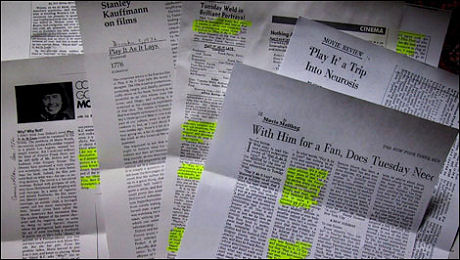
“Now, it’s one thing for a good or interesting film to slip into semi-obscurity, but Play It As It Lays has flat-out disappeared.
“That’s because it’s been out of circulation for 30 years. It’s never seen the flourescent light of a video store (as a VHS, laser disc or DVD), and there’s no mention on the internet of it ever having played on television. Search for it on the Movie Review Query Engine (www.mrqe.com) and not a single capsule review turns up.
“Calls to Universal, the negative and rights owner, indicated there’s not much awareness of this film, much less any intention to put it out on DVD. But you never know.
“All I can say is that this stylish mood piece is too heady and distinctive and was too well-reviewed during its time (by a good percentage of the critics at least, some of whom really went apeshit over it) to warrant invisibility today.
“This article is an attempt to get the Universal crew to wake up and put this sucker out on DVD, and I’m not talking about one of those bargain-basement, no-frills jobs.
“Laurent Bouzereau, the maker of dozens of brilliant DVD documentaries over the years, should be hired to assemble a looking-back doc while the participants are still around and kicking. I’m thinking especially of star Tuesday Weld, Didion (her novelist husband John Gregory Dunne, who co-wrote the script, passed away earlier this year), and producer Dominick Dunne, a plugged-in Hollywood player before his later incarnation as a novelist and Vanity Fair feature writer.
“Truth be told, Play It As It Lays sometimes feels like a bit much in terms of its despairing tone and existential hairshirt attitude. But at least it tries to disturb and provoke and point moral fingers and yet — at the same time, perversely — recreate the roguishly sexy aroma of early ’70s Hollywood so that audiences can feel what the tingle was all about.
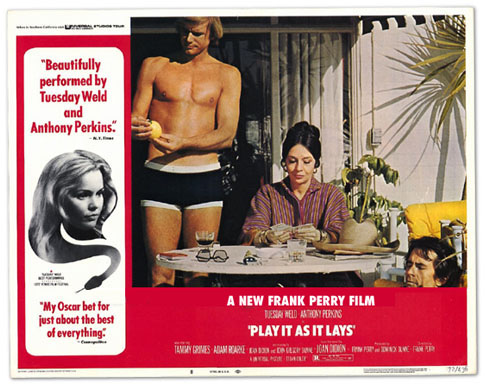
“I mean, listen to these tributes…
“‘Once every few years, a film so spectacular and intense that it creates a whole new vocabulary for film grammarians comes along,’ enthused The Hollywood Reporter‘s Nick Yanni. ‘Such a picture is Play It As It Lays.’
“The L.A. Times’ Charles Champlin declared it a new-styled ‘woman’s picture…drawn from a rarified part of Hollywood….a sub-sub-subculture,’ and said it ‘does depict its tiny exotic world with merciless skill and sobering accuracy.’
“Writing in the New York Times, film critic and novelist Ann Birstein called it ‘a study of nihilism’ that she felt ‘fascinated, moved and stunned by,’ adding that it was ‘one of the best movies I’ve ever seen.’
“The Film Journal also called it ‘one of the best films of the year.’
“Cosmopolitan film critic Liz Smith (back in the days when she was a reasonably tough and honest writer) said in a column she wrote in early November ’72 that ‘unless something extraordinary happens between now and the end of the year, Play It As It Lays will be my Oscar bet for just about the best of everything.’
“Saturday Review critic Thomas Meehan said ‘if nothing else, it is Vogue-ishly chic in its vision of L.A. and environs as contemporary Hell, in the manner of Antonioni’s Zabriskie Point.’
“Box Office magazine called it ‘an artistic triumph.’
“In her mixed review, Wall Street Journal critic Joy Gould Boyum nonetheless said it offers ‘a deeply intelligent screenplay, highly sensitive direction, and exquisite photography by [dp] Jordan Cronenweth‘ and called it ‘a very well made film.’
“There were other reviews — some of them not friendly. (Pauline Kael ripped it to shreds.) But all things considered, does this film sound like it should have sat at the bottom of a dark well for the last three decades? When critics say ‘best of the year,’ it usually means the presence of something honorable.
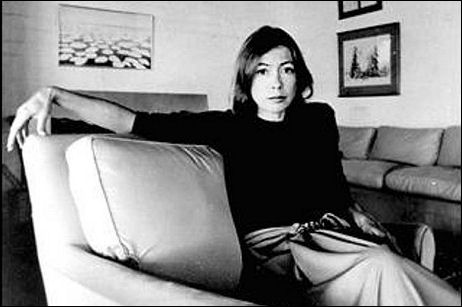
Joan Didion
“My own recollection is that Play It As It Lays was certainly above average. I recall it taking the measure of the void in ways that seemed ripe and head-turning.
“‘The corruption and venality and restrictiveness of Hollywood have become…firm tenets of American’s social faith — and of Hollywood’s own image of itself,’ Joan Didion wrote in an essay 30-plus years ago.
Then as now, it follows that people high up in the Hollywood food chain have a reputation for living spiritually arid or perverted lives, and more than a few of them being very sick puppies. I don’t know how many books and movies have used the old Hollywood Babylon thing as an atmospheric starting point since Didion’s prescient pronouncement, but I think we can safely say ‘a lot.’
“Weld’s Maria character (it’s pronounced Mar-eye-ah and not Mar-EE-ah) walks around in a state of shutdown. She doesn’t seem to be in pain as much as caught up in some kind of drifting, unable-to-play-the-game-anymore mentality. Maria’s life doesn’t seem to amount to anything purposeful or self-directed as she only seems to function as an enervated wife, friend or lover to this or that Hollywood player-with-a-penis. It has failed, in any event, to coagulate for her in a way that feels rooted or worth being a part of.
“The film is Maria’s recollection of her recent past as she recovers from some kind of breakdown in a sanitarium. She has gotten divorced from her director husband (Adam Roarke), partly due to his rage over her having had an abortion after getting pregnant by one of her lovers (Richard Anderson). She has an emotionally disturbed daughter who barely speaks. One of her core sentiments, repeatedly jotted down during her stay at the facility, is that ‘nothing applies.’
“Maria’s closest friend is her husband’s producer, B.Z. (Perkins), who closely shares her nihilist leanings.
“There’s a scene in which Maria, B.Z. and B.Z.’s wife (Tammy Grimes) are driving in a car, and Maria has just said something very spacey and who-cares? ‘You’re getting there,’ B.Z. says to Maria. ‘Where?’ she asks. ‘Where I am,” B.Z. answers. His wife quickly rejoins, ‘Where you are is shit.’
“The movie has lots of acidic, bitter-pill dialogue like this, a good portion of it dished out by Perkins. Kael said that ‘when his lines are dry, [Perkins] is the best thing in the picture.’
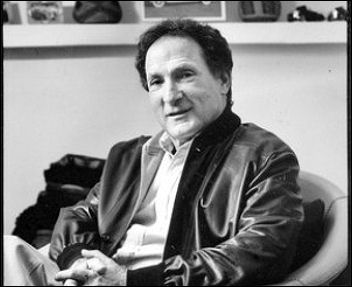
Ned Tanen
“I remember a scene at a party in which a gangster-producer type named Larry Kulick (Paul Lambert) looks at a young woman and says out loud, ‘I’d like to get into that,’ and Perkins, standing next to him and Maria and staring blankly into the crowd, saying, ‘I wouldn’t exactly call it the impossible dream.’
“And for some reason I’ve never forgotten the way Perkins delivers a smirking line about artificial lemons: ‘They’re not artificial — they’re reconstituted.’
“The film also has a nice assortment of sleazy second-bananas — a grossly egoistic TV actor (Tony Young, who comes on to Maria as she’s watching B.Z. and his lover play tennis by saying, ‘Why don’t you dump the fags?’), a pudgy assistant to an abortionist with a thing for Camaro’s (Chuck McCann), and Tyne Daly (extremely slim in those days) as an obsequious journalist interviewing Roarke during a desert location shoot.
“I called John Gregory Dunne on Monday to see whether he or Joan Didion had heard of Play It As It Lays playing anywhere in any format, or whether they’d heard of any plans to put it out on DVD, and he said no.
“Then I rang Dominick Dunne, his brother, at his Connecticut home. He said he hadn’t thought of the film in a long time (‘You know, you move on…’), but he seemed to enjoy dredging up more and more anecdotes as we talked.
“Dunne reminded me that Tuesday Weld’s performance won a Best Actress award at the 1972 Venice Film Festival. He also recalled that he gave Joel Schumacher his start by hiring him as the film’s costume designer. ‘He was doing the windows at Henri Bendel’s, and he went on from this and never looked back,’ he says. ‘It was also Joel who brought Berry Berenson out to the set to meet Tony Perkins, and out of that she and Tony got married.’
“Berenson’s life ended on September 11, 2001. She was a passenger on American flight #11 that slammed into the north tower of the World Trade Center.
“Dunne said he’s very proud of the picture and agreed it was quite admired in its day. ‘It was never a hit but there were some people who were just passionate about it,’ he said. ‘But we also had a studio chief who hated the movie, just hated it, and he would say this to anybody…’

Tony Perkins in Play It As It Lays
“‘Ned Tanen, the head of Universal at the time, hated the book and called [the script] a piece of shit on our first meeting…he was the most awful man,’ Dunne recalled. ‘They only did it…they only made it because Frank Perry had a hit at Universal a year or two before [i.e., Diary of a Mad Housewife], and Frank wanted to direct this movie… but Tanen hated ever single day’s dailies, and he was the most awful person. It was so bitter. [Tanen died early this year.]
“‘I was on a coast-to-coast flight on MGM Grand a few years later, and I was seated right next to Ned Tanen — he on the window, me on the aisle. Our elbows twice touched during lunch, but we never spoke to each other for the five-hour flight. Kevin Bacon was on the plane, and one point he came over to talk to us and he went on about this and that, thinking we were together…it was so unpleasant.’
“I called the mostly-retired Tanen to get his side of this story, but he didn’t reply. For what it’s worth, a former studio chief who’s known Tanen for years reminded me that his behavior was partly due to his being manic depressive, or what would now be called bi-polar.
“‘[Tanen] was crazy in a colorfully Hollywood way and would not fit into a studio job today,’ the former exec recalled, ‘but when he was up or on he was the most exciting and charming guy you’d ever want to meet.’
“I don’t know how to end this except throw in another quote from the film.
“It comes at the very end. Maria, having struggled her way through into a semblance of hope or sanity after reviewing what a mess everything has been, says to herself, ‘I know what nothing is, and keep on playing.’ The voice of B.Z., who has committed suicide by Seconal, is then heard to ask ‘why?’
“Weld looks at the camera, smiles serenely, and delivers what I consider one of the most cheerful closing lines in movie history.
“She says, ‘Why not?’












